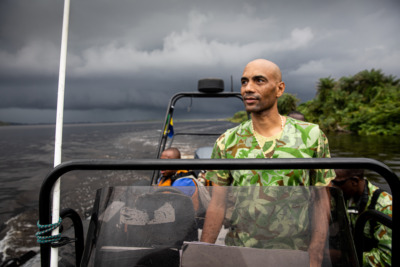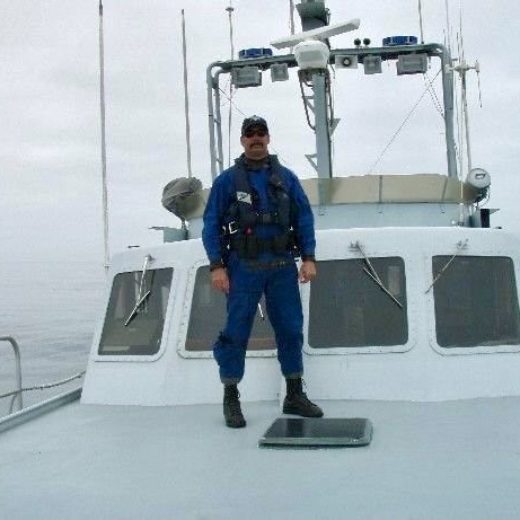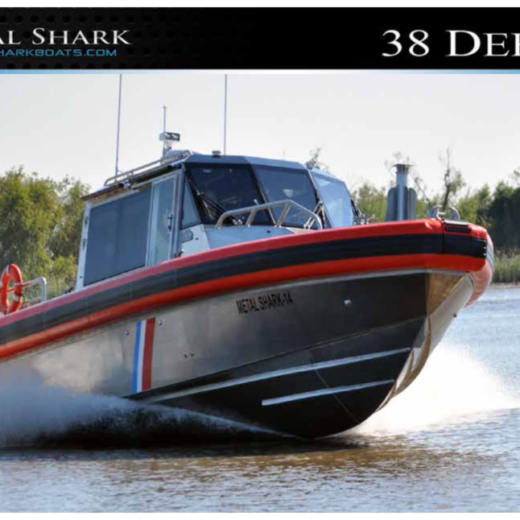
An international illegal fishing vessel was recently arrested in Gabon, representing a landmark achievement in marine enforcement, just five years after President Ali Bongo Ondimba declared the creation of nine national marine parks and one year after WildAid began supporting Gabon with technical expertise and equipment.
Last month, Gabonese fisheries enforcement officers in conjunction with Sea Shepherd’s Bob Barker crew arrested Chinese flagged Haixin 27 for illegally fishing in Gabonese waters. The ship crossed into Gabon from the Republic of the Congo and carried no logbook despite having a vessel full of fish. Although not actively fishing at the time of apprehension, electronic evidence seized on board proved the Haixin 27 had fished illegally in Gabon in the past.
A Canon EOS 7D Mark II DSLR Camera with a 18-135mm f/3.5-5.6 IS USM Lens and a Canon EF 70-300mm f/4-5.6 L IS USM Telephoto Lens were provided by WildAid and are central to supporting the investigation, which is currently underway in Port Gentil, the second-largest city of Gabon, and its largest seaport.
“The arrest of Haixin 27 further proves that Gabon’s investment in protecting its national marine parks is paying off,” says WildAid Marine Director, Meaghan Brosnan. “By making conservation a pillar of development, the Gabonese people are both safeguarding their stunning natural environment and creating a more resilient economy.”
Economically, illegal, unreported and unregulated fishing (IUU) results in a roughly $610 million net loss to the total Gabonese Gross Domestic Product (GDP) per year. In 2016, 51 vessels were inspected, and six arrests occurred. In 2017, that number increased to 80 vessels and nine arrests.
Illegal trawlers and commercial fishers, like Chinese Haixin 27 and its sister fishers Haixin 23 and Haixin 25, illegally enter Gabonese waters during tuna fishing season while artisanal fishers, which come from neighboring countries, such as Nigeria, Benin, and Ghana, tend to fish in tributaries and mangroves. Safeguarding these habitats is essential as an estimated 80% of the global fish catch relies on mangrove forests, where spawning fish seek shade and juveniles are protected until fully grown.
WildAid’s marine protection program supports in-country partners to prevent illegal fishing by providing equipment, expertise, and resources in a cost-effective and efficient manner. In Gabon, in addition to the equipment used to investigate Haixin 27, WildAid has provided a thermal monocular, which helps catch poachers at night, VHF radios, night vision binoculars, smartphones, and emergency beacons, which allow fishing vessel observers to call for help.
Later this year, WildAid will be involved in a robust training program with its Gabonese partner, the National Agency of National Parks (ANPN), which protects roughly 10% of the country’s land and marine parks and builds relationships with local fishing villages to ensure well-maintained fisheries.
“Gabon has been going through a historical transformation,” says Karima Cherif, Regional Project Manager for WildAid Gabon. “New political appointments and confiscations of illegally caught fish are sending a clear message that corruption will no longer be tolerated and the environment will come first.”
The impact of this transformation is evident in local villages, says Cherif. About two years ago, a village chief was arrested for illegally catching 12 turtles in a marine park and was sentenced to three months in jail. The chief was apprehended by none other than his nephew, an eco-guard, who then stepped in as the family’s breadwinner until the uncle was released.
“Luckily, his uncle understood that his nephew was only doing his job, and they still have a solid relationship,” says Cherif.
The ripple effect of this new, shared responsibility to protect the environment is paying off. Due to investments in new infrastructure and technical training, 250 tons of tuna was discharged last month in Gabon – the first time in the nation’s history. The added capacity is no doubt needed as Gabonese annually consume on average 40kg of fish per person, more than double the global average.
The economic impact and potential for growth in well-managed fisheries is clear. Legal fisheries contribute to roughly $1.3 billion to the Gabonese economy, around 9% of the Gabonese GDP while small-scale fisheries alone contribute $800 million to the total economy.
“Conservation management and marine protection are vital factors in Gabon’s socio-economic growth,” says Brosnan. “With more than 160 years of cumulative enforcement experience on our team, we’re committed to helping Gabon defend its wildlife and make the promise of their MPAs a reality.”
WildAid’s work in Gabon is part of its ambitious plan to strengthen enforcement of 250 marine and coastal areas by 2025. These areas have been designated as protected but lack crucial support, thereby leaving local marine wildlife and coastal communities vulnerable to overexploitation.
Please consider supporting our team’s work:






Stay in touch and get the latest WildAid updates.
SIGN UPAbout WildAid
WildAid is a non-profit organization with a mission to protect wildlife from illegal trade and other imminent threats. While most wildlife conservation groups focus on protecting animals from poaching, WildAid primarily works to reduce global consumption of wildlife products such as elephant ivory, rhino horn and shark fin soup. With an unrivaled portfolio of celebrity ambassadors and a global network of media partners, WildAid leverages more than $308 million in annual pro-bono media support with a simple message: When the Buying Stops, the Killing Can Too.
Journalists on deadline may email communications@wildaid.org


